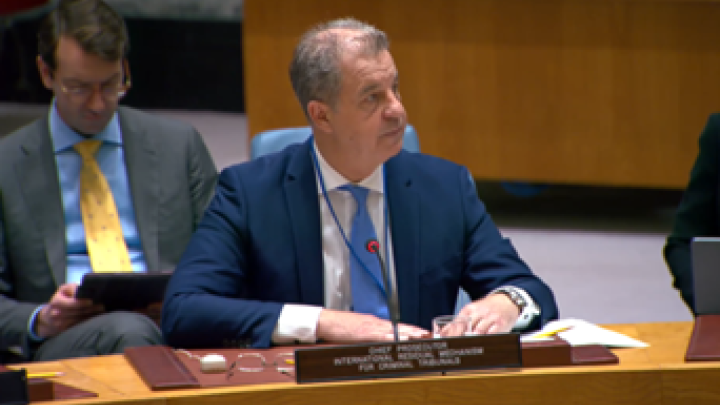Prosecutor Serge Brammertz addresses the United Nations Security Council

Serge Brammertz, Prosecutor of the International Residual Mechanism for Criminal Tribunals (Mechanism), today addressed the United Nations Security Council about the work of the Office of the Prosecutor (OTP).
Prosecutor Brammertz began by informing the Council that the OTP has concluded its important mandate to account for all fugitives indicted by the ICTR.
He noted that on 15 May, the OTP announced that it had confirmed the deaths of the last two fugitives, Ryandikayo and Charles Sikubwabo. Ryandikayo passed away in Kinshasa, DRC in 1998, while Sikubwabo died in N’djamena, Chad in 1998.
The Prosecutor explained that this result was achieved thanks to the expertise and dedication of the OTP’s Fugitive Tracking team. Over the last several years, all eight outstanding ICTR fugitives were accounted for. The OTP’s Fugitives Tracking Team arrested two fugitives, Félicien Kabuga in Paris, France in May 2020, and Fulgence Kayishema in Paarl, South Africa in May 2023, while also confirming the deaths of another six accused.
As Prosecutor Brammertz noted, “This means that all 253 persons indicted by the ICTR and ICTY for war crimes, crimes against humanity and genocide have now been accounted for. Fugitives were amongst our greatest challenges, but we persevered and succeeded. For the United Nations and the Security Council, this is an important demonstration of the international community’s determination to secure justice for atrocity crimes.”
He emphasized, however, that “while all ICTR fugitives have all been accounted for, more justice is still needed.”
Prosecutor Brammertz then turned to briefing the Council about the OTP’s work assisting national authorities continuing the accountability process for crimes committed in Rwanda and the former Yugoslavia, pursuant to its mandate under Article 28(3) of the Mechanism Statute.
Today, Member States are continuing the work of the ICTR, ICTY and Mechanism and achieving more justice for more victims in domestic courts. As the Prosecutor noted, “Member States have already achieved significant results. But more accountability is still urgently needed.” Rwandan authorities are still seeking to bring to justice more than 1,000 fugitive génocidaires. Likewise, prosecutors in the former Yugoslavia still have thousands of suspected war criminals to investigate and prosecute. Domestic authorities in third-party Member States, particularly in Europe and North America, are also prosecuting these cases under “no safe haven” policies.
To undertake this work successfully, Member States greatly need the OTP’s assistance, as demonstrated in the number and complexity of requests they submit. In the last two years alone, the OTP received 629 requests for assistance, and provided support to a total of 219 national case files.
As Prosecutor Brammertz explained, national prosecutors request a wide variety of support from the OTP, from acces to evidence, to the preparation of investigative dossiers, to strategic support in tracking fugitives and strengthening international cooperation.
He highlighted that the UN Office of Internal Oversight Services (OIOS) had positively concluded in its recent assessment that the OTP prioritized its support to Member States and successfully delivered on its mandate. This assessment included positive reports from national prosecutors, who confirmed that the OTP shared “its experience in prosecuting complex cases,” and underscored “the effectiveness of having national jurisdictions learn from concrete cases that had been processed by the ad hoc Tribunals and the Mechanism.”
As the Prosecutor noted, “In sum, the results reported by my Office, the statements of Member States and the evaluation by OIOS all confirm that my Office’s work pursuant to our Article 28(3) mandate is highly-valued and has significant impact.”
In conclusion, Prosecutor Brammertz noted that “while international accountability for the crimes in Rwanda and the former Yugoslavia has now concluded, national prosecutors are continuing our work in their courts.” Looking forward, he emphasized that domestic justice efforts “can only be successful if the support provided by my Office to Member States continues. Today, we are providing more support with more impact than ever before. This is a positive sign, and confirmation that the justice process is on the right path.”